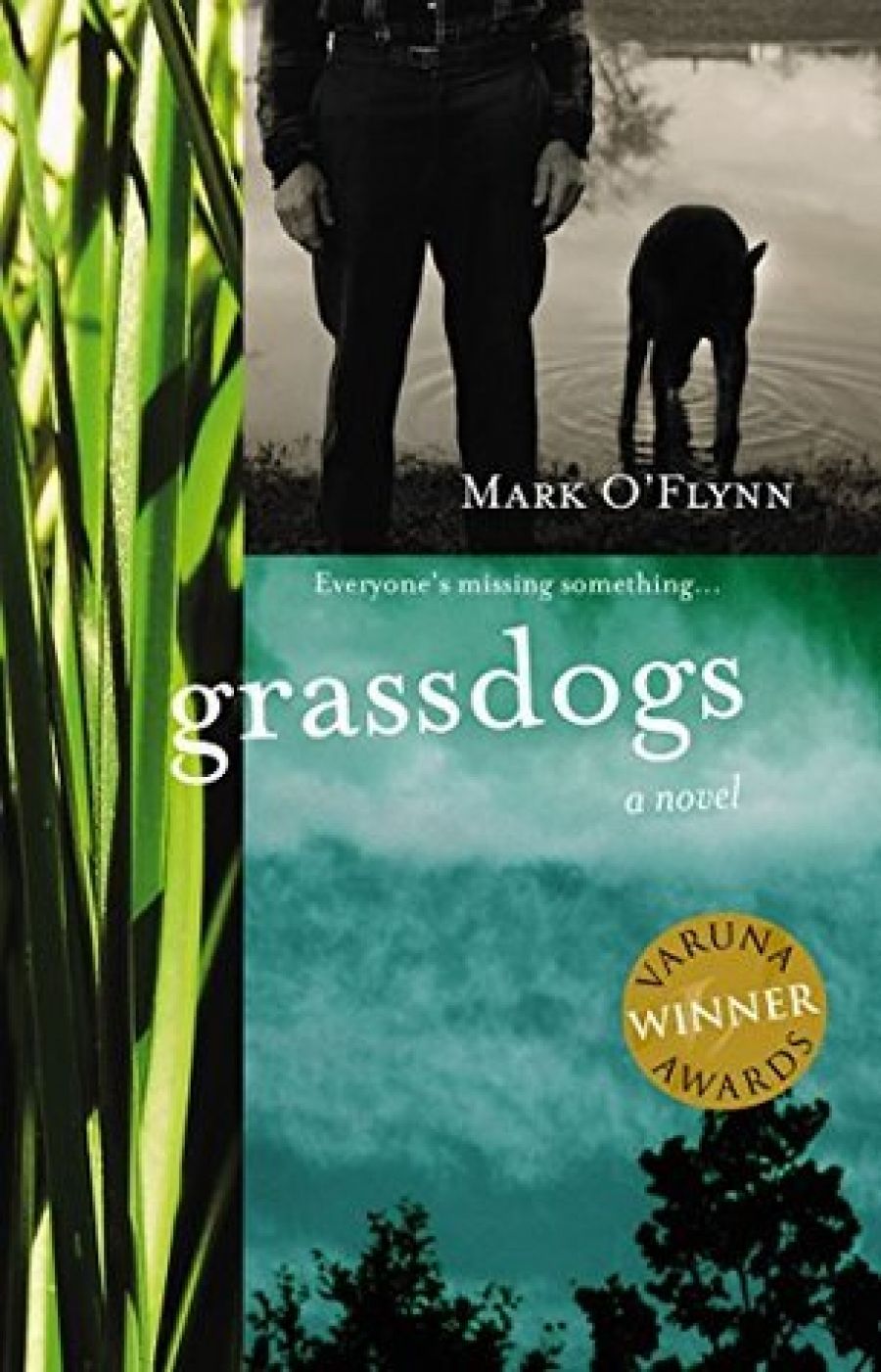
- Free Article: No
- Contents Category: Fiction
- Review Article: Yes
- Online Only: No
- Custom Highlight Text:
Grassdogs’ literary antecedents jostle like faces crowding around a porthole on a departing emigrant ship. One can tick them off like books on a required reading list for a twentieth-century Australian literature course. The doppelganger Jekyll-and-Hyde protagonists (blithe young city lawyer Tony Tindale and his bestial, increasingly wretched uncle Edgar) might have been written with actor Dan Wyllie in mind. Edgar even loses teeth in a car accident, just like Wyllie.
- Book 1 Title: Grassdogs
- Book 1 Biblio: Fourth Estate, $27.95 pb, 261 pp
- Book 1 Readings Link: booktopia.kh4ffx.net/EkDKX
Responsibility, at every level, is the subtle agenda of O’Flynn’s novel: our responsibility before the law, and the justice system’s reciprocal responsibility in ensuring the law’s fair application; society’s responsibility to its most vulnerable members; families’ responsibilities to one another. This is where Tony and his mother fit in. She seeks to atone for abandoning her brother, Edgar, when he was a baby. Orphaned at a young age, Edgar slips into a feral existence and he soon finds himself in deep trouble. The story unfolds sensually, without any overt agenda or obvious trajectory beyond burrowing into Edgar’s simple, hurt, paranoid mind. O’Flynn lets time go by lightly, so that when the dramas happen, they are all the more striking for their unexpectedness.
Thea Astley is a trace presence – an evocative one – in the grasslands and dusty soil, here, forty minutes by road out of Wagga. We can’t help but be reminded of Drylands (1999), of farm dogs ripping the cloth of night with their barking. O’Flynn’s novel makes a laconic nod in the direction of Patrick White’s The Solid Mandala (1966), especially its binary stars, Waldo and Arthur Brown. We also see glimpses of various dramatists and crossover writers such as Barry Dickins, Phil Motherwell, Daniel Keene, and Ray Mooney.
Best known, thus far, as a poet and playwright, O’Flynn has the makings of a fine Australian novelist. Already there is precision and muscularity in his writing; an admirable tendency towards understatement; a pleasing musicality; a sense of narrative shape. O’Flynn can conjure up scenes that are almost magic-realist in their melodrama, off-beat humour and casual grotesqueness. When Edgar is born, his mother is caught unawares. Mistaking full-blown labour pains for mere Braxton Hicks contractions, she continues her work in her country kitchen, making scones: ‘By the time Alf got back to the house, the mother was half conscious on the kitchen floor in a pool of amniotic fluid, covered in a dusting of flour.’
O’Flynn’s writing is anything but lazy. His metaphors might not look ambitious next to John Banville’s, say, but they are rarely wrong or jarring. ‘Inside her clothes she was as frail as a stick’, is about as far off the mark as O’Flynn gets, and why I thought of the Irish author, who penned the immortal line: ‘The day was damp and fresh as a peeled stick.’ Within a few paragraphs, O’Flynn earns a pardon: ‘The light is as familiar to [Edgar] as milk.’ Best of all, a ring around the moon on a misty night is likened to ‘a cataract in an old dog’s eye’.
Oddly enough, given that O’Flynn is a playwright, dialogue is a minor but nagging problem in Grassdogs. In trying to capture Edgar’s simpleton’s drawl, O’Flynn makes his ‘caveman with a credit card’ sound a lot like Bad Boy Bubby, and the ‘father’, Alf, sounds alarmingly like Groundskeeper Willy from The Simpsons.
Don’t be put off by Grassdogs’ weak opening chapter. It serves as a framing device of sorts, but hardly an essential one. The closing chapter is a minor masterpiece, an eleven-page glimpse into the writer that Mark O’Flynn should become.


Comments powered by CComment